Solar eclipse of August 1, 1943
| Solar eclipse of August 1, 1943 | |
|---|---|
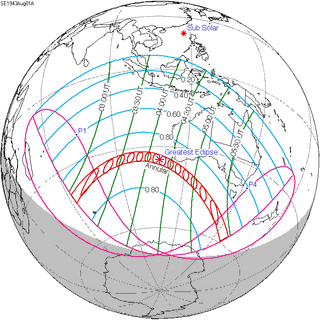 Map | |
| Type of eclipse | |
| Nature | Annular |
| Gamma | -0.8041 |
| Magnitude | 0.9409 |
| Maximum eclipse | |
| Duration | 419 sec (6 m 59 s) |
| Coordinates | 34°48′S 108°36′E / 34.8°S 108.6°E |
| Max. width of band | 367 km (228 mi) |
| Times (UTC) | |
| Greatest eclipse | 4:16:13 |
| References | |
| Saros | 125 (50 of 73) |
| Catalog # (SE5000) | 9383 |
An annular solar eclipse occurred on August 1, 1943. A solar eclipse occurs when the Moon passes between Earth and the Sun, thereby totally or partly obscuring the image of the Sun for a viewer on Earth. An annular solar eclipse occurs when the Moon's apparent diameter is smaller than the Sun's, blocking most of the Sun's light and causing the Sun to look like an annulus (ring). An annular eclipse appears as a partial eclipse over a region of the Earth thousands of kilometres wide. Annularity was visible in the southern Indian Ocean, with the only land being Île Amsterdam in French Madagascar (now belonging to French Southern and Antarctic Lands). A partial solar eclipse was visible from Australia, Indonesia, Malaysia, eastern Madagascar, Antarctica's Wilkes Land.
Related eclipses[]
Solar eclipses 1942–1946[]
This eclipse is a member of a semester series. An eclipse in a semester series of solar eclipses repeats approximately every 177 days and 4 hours (a semester) at alternating nodes of the Moon's orbit.[1]
Note: The partial solar eclipse on September 10, 1942 occurs in the previous lunar year eclipse set.
| Solar eclipse series sets from 1942–1946 | ||||
|---|---|---|---|---|
| Ascending node | Descending node | |||
| 115 | August 12, 1942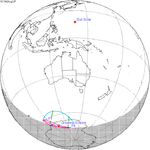 Partial |
120 | February 4, 1943 Total | |
| 125 | August 1, 1943 Annular |
130 | January 25, 1944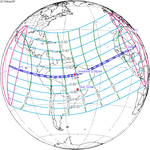 Total | |
| 135 | July 20, 1944 Annular |
140 | January 14, 1945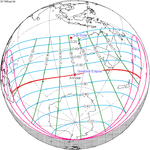 Annular | |
| 145 | July 9, 1945 Total |
150 | January 3, 1946 Partial | |
| 155 | June 29, 1946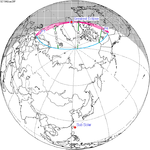 Partial | |||
Saros 125[]
Solar saros 125, repeating every about 18 years and 11 days, contains 73 events. The series started with a partial solar eclipse on February 4, 1060. It has total eclipses from June 13, 1276, to July 16, 1330. It has hybrid eclipses on July 26, 1348, and August 7, 1366, and annular eclipses from August 17, 1384, to August 22, 1979. The series ends at member 73 as a partial eclipse on April 9, 2358. The longest total eclipse occurred on June 25, 1294, at 1 minute and 11 seconds; the longest annular eclipse occurred on July 10, 1907, at 7 minutes and 23 seconds.[2]
| Series members 47–58 occur between 1881 and 2100: | ||
|---|---|---|
| 47 | 48 | 49 |
 June 28, 1889 |
 July 10, 1907 |
 July 20, 1925 |
| 50 | 51 | 52 |
 August 1, 1943 |
 August 11, 1961 |
 August 22, 1979 |
| 53 | 54 | 55 |
 September 2, 1997 |
 September 13, 2015 |
 September 23, 2033 |
| 56 | 57 | 58 |
 October 4, 2051 |
 October 15, 2069 |
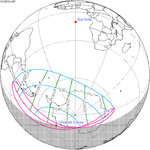 October 26, 2087 |
Metonic series[]
The metonic series repeats eclipses every 19 years (6939.69 days), lasting about 5 cycles. Eclipses occur in nearly the same calendar date. In addition, the octon subseries repeats 1/5 of that or every 3.8 years (1387.94 days). All eclipses in this table occur at the Moon's ascending node.
| 22 eclipse events between December 24, 1916 and July 31, 2000 | ||||
|---|---|---|---|---|
| December 24–25 | October 12–13 | July 31-Aug 1 | May 18–20 | March 7–8 |
| 91 | 93 | 95 | 97 | 99 |
| December 23, 1878 | October 12, 1882 | July 31, 1886 | May 18, 1890 | March 7, 1894 |
| 101 | 103 | 105 | 107 | 109 |
| December 23, 1897 | October 12, 1901 | August 1, 1905 | May 19, 1909 | March 8, 1913 |
| 111 | 113 | 115 | 117 | 119 |
 December 24, 1916 |
October 12, 1920 |  July 31, 1924 |
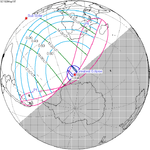 May 19, 1928 |
 March 7, 1932 |
| 121 | 123 | 125 | 127 | 129 |
 December 25, 1935 |
 October 12, 1939 |
 August 1, 1943 |
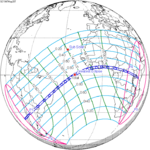 May 20, 1947 |
 March 7, 1951 |
| 131 | 133 | 135 | 137 | 139 |
 December 25, 1954 |
 October 12, 1958 |
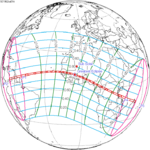 July 31, 1962 |
 May 20, 1966 |
 March 7, 1970 |
| 141 | 143 | 145 | 147 | 149 |
 December 24, 1973 |
 October 12, 1977 |
 July 31, 1981 |
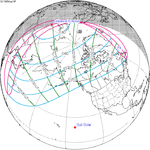 May 19, 1985 |
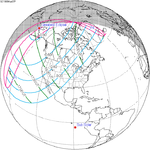 March 7, 1989 |
| 151 | 153 | 155 | 157 | 159 |
 December 24, 1992 |
 October 12, 1996 |
 July 31, 2000 |
May 19, 2004 | March 7, 2008 |
| 161 | 163 | 165 | 167 | 169 |
| December 24, 2011 | October 13, 2015 | August 1, 2019 | May 19, 2023 | March 8, 2027 |
Notes[]
- ^ van Gent, R.H. "Solar- and Lunar-Eclipse Predictions from Antiquity to the Present". A Catalogue of Eclipse Cycles. Utrecht University. Retrieved 6 October 2018.
- ^ Saros Series Catalog of Solar Eclipses NASA Eclipse Web Site.
References[]
- Earth visibility chart and eclipse statistics Eclipse Predictions by Fred Espenak, NASA/GSFC
- Annular solar eclipses
- 1943 in science
- 20th-century solar eclipses
- August 1943 events
- Solar eclipse stubs



